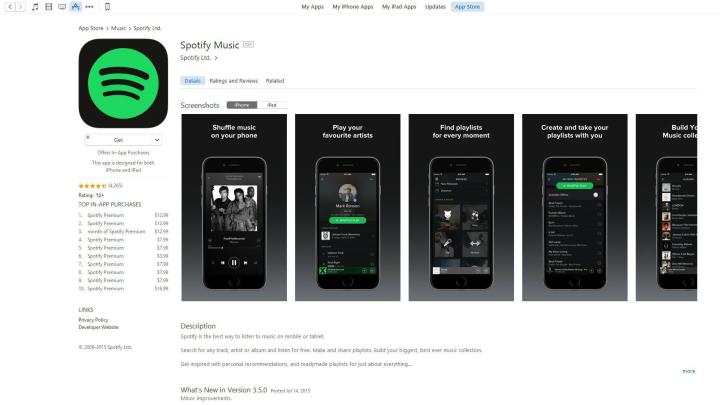
Primarily at issue is the cut that Apple demands of all App Store transactions. Rival music services, as are purveyors of eBooks, newspapers, magazines, movies, and TV shows, are subject to a 30 percent fee on digital wares sold with Apple’s in-app purchase API. The de facto tax around the API, the use of which is required for App Store approval, have led streaming services like Tidal, Spotify, and Rdio to compensate for lost revenue by folding the cost into subscriptions through iOS. Spotify, for instance, prices subscriptions at $12.99 a month on the App Store, or $3 more than the $9.99 it charges on its website.
That pricing discrepancy is incredibly apparent next to Apple’s self-titled Apple Music, which starts at $9.99. Certainly, rival services could swallow the added App Store cost, but the streaming music industry’s razor-thin margins — Spotify pays 70% of its income back to the music industry, according to CEO Daniel Ek — make that strategy unpalatable, if not untenable.
A tax on revenue isn’t the only disadvantage rival music services on iOS face. Apple’s terms prohibit apps from pointing to (often cheaper) storefronts beyond the App Store’s walled garden. (Spotify recently worked around this restriction by sending an e-mail blast about lower prices to its customers.) And, unlike Apple Music, third-party services aren’t allowed to offer promotions or family plans. “It’s absurd that a company like Apple can have its cake and eat everyone else’s,” an industry source told The Verge.
Take the policies all together and they begin to sound prejudicial. None are new — companies like Amazon have protested them for years by refusing to sell goods through the App Store — but the debut of Apple Music and the company’s stranglehold on music sales have magnified scrutiny. According to research firm MusicWatch, iTunes retains a 52 percent dominance of paid track and album downloads in the U.S.
Apple, no doubt aware it’s attracted the ire of the FTC, has entertained the notion of adjusting its 30 percent fee. On Apple TV, it already offers a more generous split — 15 percent of revenue. But just what form the new split will take, and whether it’ll be amenable to third-party services and pass FTC muster, remains to be seen.
Editors' Recommendations
- Apple Music just got a cool feature you won’t find on Spotify
- How much is Apple Music, and how can you get it for free?
- Spotify finally adds real-time lyrics support to its mobile apps
- Epic, Spotify, Match, and more team up to fight Apple
- Apple Music still trails Spotify as growth continued for music streaming in 2019


